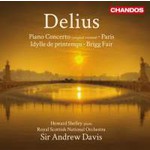
Piano Concerto / Paris / Brigg Fair / etc
 $40.00
Out of Stock
$40.00
Out of Stock6+ weeks add to cart
DELIUS
Piano Concerto / Paris / Brigg Fair / etc
Howard Shelley (piano) / Royal Scottish National Orchestra, Sir Andrew Davis
[ Chandos / Hybrid SACD ]
Release Date: Monday 15 October 2012
This item is currently out of stock. It may take 6 or more weeks to obtain from when you place your order as this is a specialist product.
"Sonics are excellent for a standard CD."
(AudAud.com)
"The major interest here is the Delius Piano Concerto, presented for the first time in its original three-movement form rather than the single-movement version heard on previous recordings. The composer began working on his concerto after first hearing Grieg's Piano Concerto, but then let it falter. Later he met virtuoso pianist-composer Busoni and that spurred him on to complete his Concerto. In fact he performed the concerto on two pianos with Busoni at one point. It had its premiere as a piano concerto with orchestra in 1904. It is strongly Romantic in nature, with hints not only of Grieg but also of Liszt. Its Largo movement has a melancholy theme in the same key as the theme of Grieg's slow movement in his Piano Concerto. The piano is in the spotlight at the beginning of the final movement, and it closes in a majestic fashion.
The "Morceau symphonique" of Idylle de printemps was entirely new to my ears, and is a glorious little ten-minute Delius pastoral piece. Brigg Fair is heard in Sir Thomas Beecham's revised version, as is the Delius Nocturne Paris - The Song of a Great City. The first is probably one of the finest works of the composer: an inspired "English Rhapsody." The latter is a programmatic depiction of a night in Paris, beginning with dusk and ending with the coming of the dawn. Sonics are excellent for a standard CD." (AudAud.com)
"Delius's piano writing isn't that of a natural virtuoso, but here Shelley transforms it with some really sensitive phrasing and an ability to make the patterns of the figuration sound idiomatic...Davis proves himself an instinctive Delian in the way he delineates the shifting moods and colours of Paris and Brigg Fair: these must be among the best current accounts of both works." (BBC Music)
"Shelley and Sir Andrew Davis bring rather more in the way of epic ambition and romantic ardour to this likeable music [the Concerto] than do their Hyperion rivals, though at times greater rhythmic snap would not have gone amiss...As for the remainder, Davis makes a lovely job of the early Idylle de printemps." (Gramophone)
Of the works performed here by the Royal Scottish National Orchestra under the prominent Delius interpreter Sir Andrew Davis, the first three (Paris, the Piano Concerto, and Idylle de printemps) offer a fascinating insight into the early years of the development of Delius as a composer, when he was slowly and painstakingly honing his craft, and assuming the characteristic personal voice that is evident in more mature works such as Brigg Fair.
Paris, sub-titled 'The Song of a Great City', is strongly inspired by the composer's many years of living and working in Paris. With large-scale orchestral forces, Delius paints opulent pictures of a city that he obviously loved. The slow opening portrays the still darkness falling over Paris; then the music changes pace and takes us through the teeming and intoxicating nightlife of the city, with impressions of exuberant dance music coming from the many cafés and music-halls. The opening material returns, culminating in the sounds of the awakening streets.
Until recently Delius's Piano Concerto has been know exclusively in its final, one-movement form, which was first performed in London in 1907. The version recorded here, however, represents the composer's earlier thoughts, from 1897. Performed by Howard Shelley, the work is brimming with full-bodied romanticism while showing the influences of Grieg and Liszt throughout.
The airy mood of Idylle de printemps points to later depictions of nature in Delius's music, as in Brigg Fair, which Delius categorised as 'An English Rhapsody'. Cecil Gray, the Scottish music critic and composer, described the opening of Brigg Fair as 'evoking the atmosphere of an early summer morning in the English countryside'. The work is based on a folk-tune which came to light in a competition instigated by Percy Grainger in 1905 to find 'the best unpublished old Lincolnshire folk song or plough song'. Grainger was immediately taken with the folk-tune, and having arranged it himself for solo tenor and chorus, he approached Delius to write orchestral variations on it - urging him on as the only composer worthy of the task. Delius was soon persuaded, and Brigg Fair became one of his best-loved works.
Tracks:
Paris - Song of a Great City
Piano Concerto in C minor (original 1897 version)
Idylle Printemps
Brigg Fair
